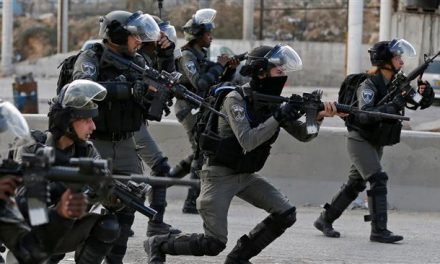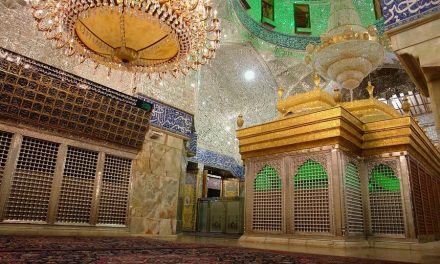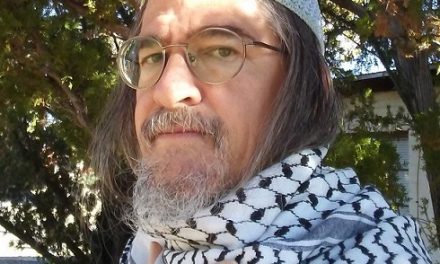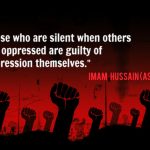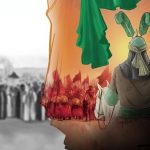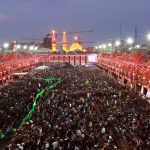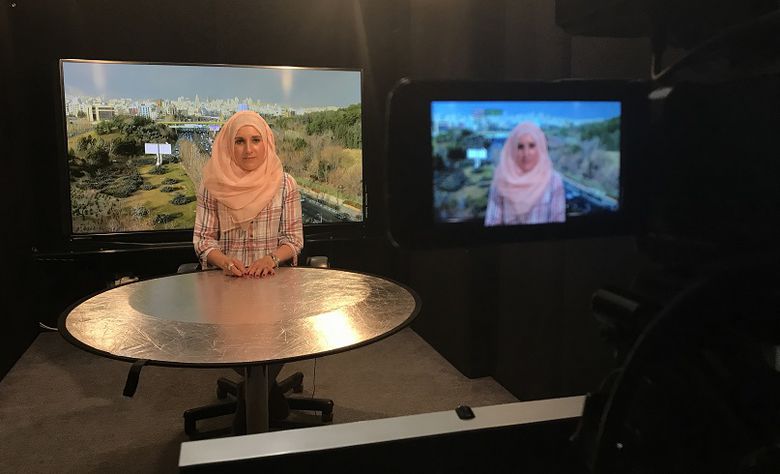
Shia Followers has conducted an exclusive interview with Catherine Shakdam, the author of Arabia’s Rising – Under The Banner Of The First Imam, to discuss Islam, Jihad and Takfirism.
“I believe the struggle set forth by Imam Khomeini is the true Jihad. His call for an Islamic Revolution was not limited to politics, but to Society as a whole. His ambitions were not for himself but to see restore Islam and the teachings of our Imams,” she said.
“True Jihad is found wherever and whenever the oppressed offer resistance to their tyrants. True Jihad is found in speaking up for those who cannot, act for those who cannot, and stand for those who will not.”
In what follows, the full transcript of the interview has been presented.
What does jihad mean? Why do some people describe jihad as “the holy war”?
Catherine Shakdam: I think that the meaning of Jihad was misappropriated centuries ago to justify the hegemonic ambitions of Arab leaders, who, for a need of popular support and political legitimacy thought to root their fight within Islam to then give their rule some degree of sanctity.
Jihad – as it is meant in the Quran, and in the sense that the Prophet Muhammad intended it, translates as struggle. The struggle of oneself over one’s passions and faults. Such struggle was meant as a mean to elevate our human condition for the better of society – so that the weak would be offered protection, and for justice to be a pillar of society. Jihad could be compared to a form of intellectual and emotional enlightenment.
Jihad also means resistance against oppression and tyranny. It means to struggle in the pursuit of Truth when tyrants ambition to enslave the weak, and pervert the laws.
But Jihad is always enacted in a state of self-defense, never in aggression – there lies the biggest misconception of all.
It is a pity but much of Islamic history has seen men of power defile the concept of Jihad so that their actions, their greed, their disloyalty, and betrayal of the tenets of Islam would be justified under the claim of Jihad.
I’m sure your readers will recall how a faction of Muslims called for Jihad against Imam Ali when the Caliphate had been entrusted to his rule. Readers will then understand how the concept of Jihad has since then been used and abused by illegitimate parties.
More recently the word Jihad has been linked to Islamic terrorism. Again here such misconception fits within an agenda that would like to see Islam discredited and Muslims reviled as dangerous.
History is full of such example where one people, one civilization, one nation uses cultural misappropriation, slander, and ethnocentric prejudices to portray the ‘other’ – the designated enemy, as inhumane and repulsive so that its annihilation could be rationalized and accepted.
The Romans used to refer to all non-Romans as barbarians, inferring their own superiority and humanity over all others.
Today such misappropriation has been promoted by western liberals and neocons. What better way to instil fear and justify forever wars but to argue the inhumanity and violence of Islam, and thus by association the Islamic world?
I would say as well that certain school of thoughts – mainly Wahhabism and Salafism, have strived on the promotion of Jihad as a euphemism for military colonialism. The Ottomans built an empire on such concept of Jihad, Al Saud dynasty ripped the Middle East apart over it, and terror militants such as Daesh or al-Qaeda rose a pervert ideology over it.
As far as the need to compare Jihad to a Holy war I think we must first understand the need the West has had to define Islam within the limit of its own vocabulary. The Western world lived through a series of Holy wars – the Crusades, and so it has learnt to look onto Jihad as an expression of such wars.
And to an extent it is true. It is true on the basis of illegitimate misappropriation of the word Jihad.
Jihad carries within a call for peace and enlightenment, not violence and bloodshed.
I will quote here Imam Khomeini as I believe he best encapsulated the definition of Jihad in his teachings: “Jihad denotes struggling for rightness. In Islamic culture, it means humankind’s conscious struggle with the enemy, for God and the society. Regarding its objectives, Jihad divides into different kinds: defending Jihad against the armed aggression, the primary Jihad that is essentially for Islam invitation, and Jihad against the followers of insolence (that is, those who act against the Weak). The main purpose of all kinds of Jihad in Islam is the removal of tyranny. A person who is killed for God is named the martyr. According to a prophetic tradition, Jihad against the infidels and tyrannies is named Minor Combat , and against the self (that is struggle with the ethical and Satanic vices) is Major Combat which is more difficult than the previous one.”
How do you differentiate between jihad and war? Does the mainstream media suggest that they are the same?
Catherine Shakdam: Absolutely! Mainstream media, we must understand, care very little for the truth, let alone accuracy. News outlets would much rather shock their readers with inflammatory rhetoric to inflate their bottom lines and generate readership than commit to reporting on facts.
And so of course media have generalized the concept of Jihad according to the definition they were given by the likes of Saudi Arabia.
The Saudi lobby has everything to do with the way Islam and Muslims continue to be portrayed in mainstream media.
You only have to look at the digital army the kingdom has committed to its payroll to understand how easy it would be to set the record straight, if only that was the plan.
The plan was and is to discredit Islam, to rebrand it to its new masters: Al Saud.
Is Islam a religion of peace or war?
Catherine Shakdam: Islam is a religion of Justice. Islam is a religion of Truth. The Quran deals with matters related to violence and war because such is the nature of men to usurp others’ right. It is the duty of a legitimate leader to answer to such violence and restore the rule of law.
Islam is not binary, it is whole and complete.
Who do you regard as the true symbols of jihad in today’s world?
Catherine Shakdam: I’m afraid my answer may not be popular in many circles, but I believe the struggle set forth by Imam Khomeini is the true Jihad. His call for an Islamic Revolution was not limited to politics, but to Society as a whole. His ambitions were not for himself but to see restore Islam and the teachings of our Imams.
True Jihad is found wherever and whenever the oppressed offer resistance to their tyrants. True Jihad is found in speaking up for those who cannot, act for those who cannot, and stand for those who will not.
True Jihad is also found in our ability to offer justice to our enemies, and compassion to those who offered us none.
I don’t think that our modern history has seen more brilliant examples of true Jihad than in the leadership of Ayatollah Khomeini and Ayatollah Khamenei.
What’s your take on the resistance movement’s jihad against takfiri terrorists?
Catherine Shakdam: My take is quite simple: such resistance movements are necessary. Without such movements, without our resistance fighters, Daesh would have outrun Syria and Iraq already. Without such sacrifice we would all have fallen.
We owe the Resistance more than can ever be said.
What role have Sunni and Shia Muslims played in the war against ISIS (Daesh)?
Catherine Shakdam: That’s a difficult question … and I’m afraid that here too many will be upset by my answer. Shia Muslims sacrificed beyond everything that could have been asked of them to defeat the monstrosity that is Daesh.
Sunni Muslims I fear saw Daesh … at least in the beginning, as a mean to subdue Shia communities into submission out of a deep-seated belief that they stand superior. It is a pity but such is the divide that was created in between Sunnis and Shias.
It is true however that Sunnis rallied to their Shia brothers to combat Daesh after they witnessed and suffered the atrocities of Daesh.
Sunni Islam has not done enough to denounce Islamic terrorism though. Let’s remember that Islamic terrorism claims itself to be Sunni. Let’s not forget that Islamic terrorism hails from a long tradition of Sunni leaders who, for their hunger of power, were willing to sell Islam to disgraceful scholars.
Catherine Shakdam is a political analyst, writer and commentator for the Middle East with a special focus on radical movements and Yemen. A regular pundit on RT and other networks, her work has appeared in major publications such as MintPress, RT, Press TV, the Foreign Policy Journal, Mehr News, the Guardian, Middle East Eye, the Middle East Monitor and many others. The Director of Programs at the Shafaqna Institute for Middle Eastern Studies, Catherine is also the co-founder of Veritas Consulting. In 2015 her research on Yemen was quoted and used by the UNSC in a resolution on Yemen Looted Funds. She is the author of Arabia’s Rising – Under The Banner Of The First Imam.

